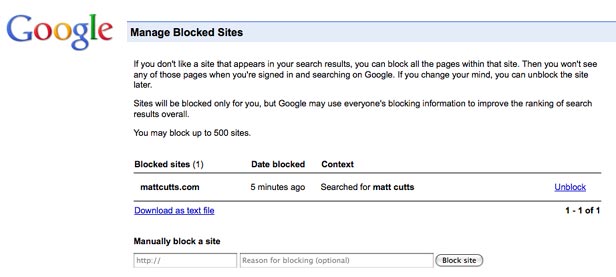At Pubcon in Las Vegas today, Matt Cutts and Amit Singhal, two key members of Google’s search team, took the stage to talk about Google search, and answer questions from webmasters.
Here are 24 takeaways from what they said:
1. Google is getting better at communicating with webmasters.
2. Mobile and social are the future.
3. Google is getting better at understanding more of the content that resides on a page – specifically how much content is above the fold.
4. If you have too many ads (not specified as AdSense ads, mind you) that distract from the content, you may have problems.
5. Better understanding of page factors that improve quality is a focus of Google.
6. Layout of the page will matter even more in the future
7. People using Google Voice and Siri still go to Google when those things fail
8. Google might roll out some kind of replacement for the “+” operator which was recently changed (in favor of Google+ Direct Connect, as we now know).
9. Google might start communicating with webmasters about certain software being out of date the way they do with WordPress.
10. Google wants to be more transparent about algorithm updates, and will announce them as they go (we’ve already seen this with the Panda and Freshness updates).
11. Google suggests telling Google when you publish content using email alerts and set up pubsubhubbub in Webmaster Tools to help them better see that you publish the content before scrapers scrape it.
12. Doorway pages are a bad idea
13. High quality content is something you can send to a child and they can learn something from
14. Google says Panda has been a positive change across all of its known measurements, but they acknowledge that no algorithm is perfect, and encourage webmasters to report issues.
15. Google has an excel sheet of 500 sites from a thread in Google Webmaster Help Forum (presumably the one discussed here).
16. There is a person responsible for false positives.
17. Google says that while they don’t care about brands, per se, there is something about brands that users associate with relevance.
18. Google has spam fighters in 40 languages.
19. Google says you should expect search to become more personal in the coming months.
20. Google will not back off on SSL, but might move forward on it.
21. Links obtained by using press releases are only helpful when people pick them up and create their own stories from them.
22. As Google focus on quality, who wrote it (authorship) and who their friends are (social) are main focuses.
23. Google tries to remove parts of sites that are spamming. Sometimes action is taken on the entire site. Google says it reserves the right to cut parts of sites.
24 .When asked about Google not tracking keywords in analytics, and why they’re not providing more detailed query data in Webmaster Tools due to the SSL feature, Google says you can get the top 1,000 queries and 96% of sites get all queries . To give it to the other 4%, would increase their data storage by 4 times. They are looking to upgrade it via download or APIs.
Here’s some Twitter reaction to the session:
I believe @mattcutts would make a great politician. He has the ability to sound good without providing useful input. #pubcon #googlesslscam
awesome Q&A time in the #pubcon keynote with @mattcutts and amit. Plenty of good stuff and laugh out loud moments. #winning
The Google groupies are crashing the stage for any millisecond they can get with @mattcutts #pubcon http://t.co/iNaXjIgi
I can definitely attest to the fact that Cutts is like a rock star at these events. I remember at Google I/O last year, he could hardly walk down the hall without people swarming him as if waiting for an autograph (the autograph in this case being site advice). Like only the coolest rock star, however, he would actually take the time to sit down with people and help them.
Here’s coverage of a webmaster video Cutts tweeted out, about page speed.
Hat tip to Search Engine Roundtable for providing live notes of the Q&A.

























